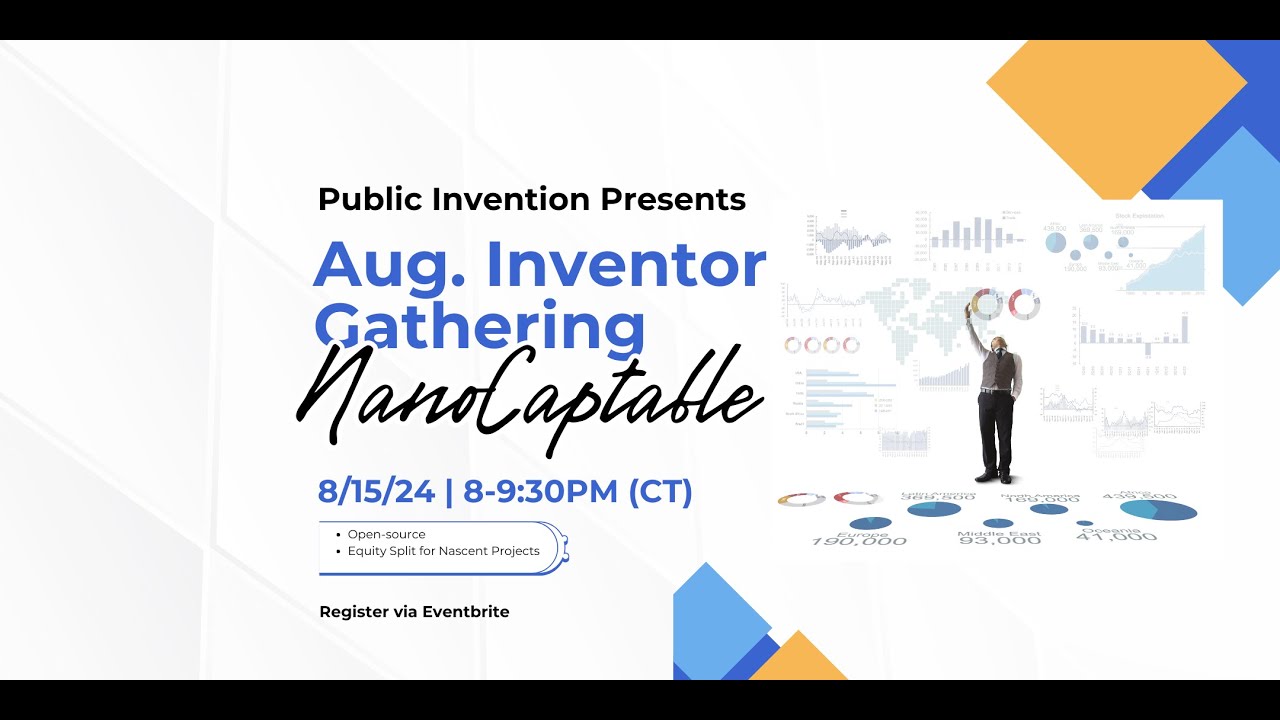The NanoCap Table: Open-Source in Equity Shares and Technology
As a student at Purdue University studying computer science, Public Inventor Prajwal Shah became interested in broadening his professional horizons through volunteer work. He was motivated to gain hands-on experience working on active projects that were both relevant to his skillset, and impactful to those who used them. This aim eventually led him to Public Invention, whose mission to create open-source engineering projects for the free use of the wider public connected with his wider goals.
“I knew a lot about the fundamentals of software engineering and coding,” Shah said, “but I didn’t really have relevant, real world experience, or impactful experience. So, what drew me to Public Invention was the ability to work on something that had relevancy but also impact.”
Shah joined the nonprofit at the end of his freshman year, and Head Coach Robert Read quickly assigned him to an upcoming project, the NanoCap Table. The central aim of this project was to support transparency around each contributor’s share of equity in small or startup companies. The project itself was also an example of transparency. In line with Public Invention’s mission to “Invent in the Public, for the Public”, the entirety of the project was posted on GitHub and is currently available for download and free use at any time.

“The NanoCap Table stemmed from [Rob’s personal experience with nascent startups] that dove into equity in different types of projects, so not just financial equity, but any kind of ownership stake. It was hard to track contributions, and hard to handle [equity] dilutions,” Shah said. “The main challenge [in the Table’s development] was implementing it in a way that kept it simple, stateless, and with low overhead, while actually still being useful.”
Shah was not the only inventor working on the Table. He joined a team of Invention Coaches, including Robert Read, who spearheaded the project, and Christina Cole, who supported its financial and accounting side.

Together, the team overcame these obstacles by avoiding overcomplicated valuation and direct bookkeeping methods, and placing the source code on a serverless site, namely GitHub. This allows users to make a direct copy of the source code and then deploy it independently, eliminating any ‘middle-man’ software while retaining the openness and simplicity of the table.
“Open-source accelerates development and growth.” – Prajwal Shah
Shah also shared his initial vision for the project, and his motivation for supporting transparency in business.
“It’s important to make some of that information [about equity] open-source when you want to have more trust in your project. The good thing is, with our default setup,” Shah said, “all the equity information is fully open-source as well.”
The NanoCap Table has been successfully completed, and is available on GitHub for free usage. Aimed at small businesses and startups, Shah and the NanoCap team have been pleased with the audience it has already found. If interested in using the source code, the GitHub repository is currently open and ready for forking. Additionally, to learn more, watch the related demo video in the recorded Inventor’s Gathering from fall of 2024.
Open-Source in Business and Technology
Shah also reflected on the importance of transparency in technology, especially computer science. Not only is it beneficial for those who can directly use a published project, but the free sharing of ideas also expedites overall technological development in the industry, develops new talent, and can even prove profitable for for-profit organizations.
“Even if you’re trying to make money, it makes sense to be open-source. There’s numerous examples of that,” Shah stated. “Open-source accelerates development and growth in the way that I don’t have to hire someone to work on my project. If someone thinks it’s interesting, they’ll make a fork or they’ll make a PR, and I’ll look at it like, ‘Okay, let’s merge it in.’ So, it builds that developer community.”
“You [can] create good software without having a financial incentive if you have enough people working on it who also think it could be useful.” – Prajwal Shah
Shah has since moved on from Public Invention, focusing on his studies and other open-source projects with his classmates. However, he reflected on his experience with Public Invention and the open-source community at large, crediting them for part of his professional and technical development. He invited others to take advantage of similar opportunities by making their own open-source projects or collaborating on pre-existing repositories.
“You [can] create good software without having a financial incentive if you have enough people working on it who also think it could be useful. That’s if you try to make your own open-source project. But something I wish I did, which I did not do, was to get involved in an existing project. That’s a lot more daunting, because you’re going to be seeing this massive code base and have no idea [what to do],” Shah said. “If you’re trying to get into software development, working in open-source gives you the experience to do that with a lot less downside, because if your code is not great, they’re just not going to merge it in.”
The NanoCap Table project demonstrates the importance of transparency through the open sharing of information in both business and technology. Ultimately, Shah’s work with Public Invention, open-source projects, and transparent business practices all align with an overarching mission; to support innovation, trust, and transparency in every endeavor, for the benefit of everyone involved.
If you are interested in joining our mission or a similar project, feel free to reach out to Founder and Head Coach Robert Read or Volunteer Coordinator Miriam Castillo. Additionally, consider submitting a donation.


